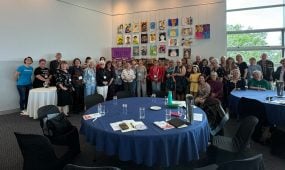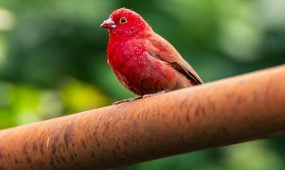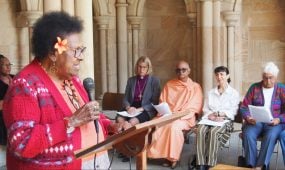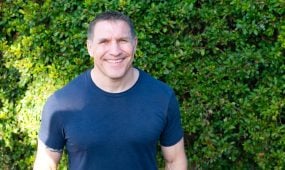To Fargo and back
Reflections
“Hugging people with tears of joy was the highlight of my recent trip to the US for me. We former Lost Boys had lots to reminisce about because we are such good friends — we kept each other alive on the long desert journeys and during our 15 years in the refugee camps,” says Bishop Daniel Abot
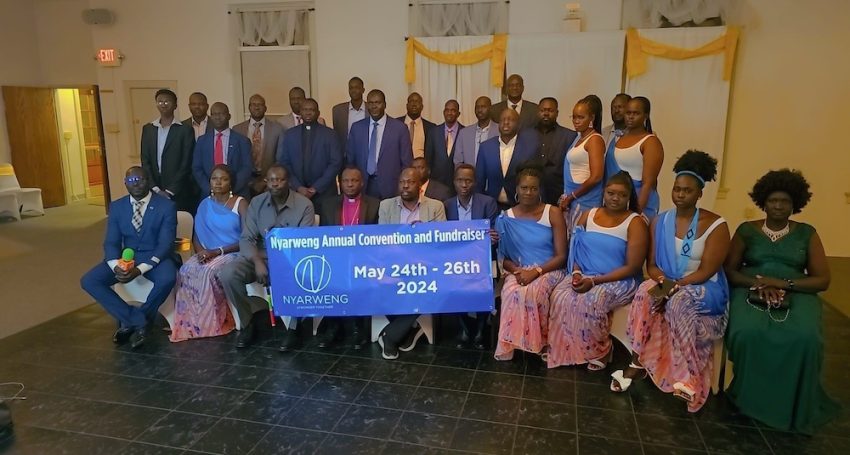
I recently returned from a trip to the United States where I spoke at a convention of US South Sudanese citizens and attended an important gathering of fellow former “Lost Boys”.
The convention was also a fundraiser for food, fuel, medicines and other living expenses for people living in South Sudan and in neighbouring countries whose economies have been impacted by the war in Sudan since April last year.
South Sudan’s economy relies on oil. Because South Sudan’s oil is refined in Sudan, the South Sudanese economy is collapsing due to the war there.
The annual convention this year was about updating delegates about what is happening in the whole community of Duk in South Sudan, particularly about the hardship people are experiencing there.
People came from all over the United States and Canada for the convention and fundraiser in the city of St Joseph, Missouri.
A short explanation is needed here. All across the world where South Sudanese refugees have been welcomed and rebuilt their lives, we answer the call to assist those in refugee camps in Kenya, Uganda and Ethiopia, as well as internally displaced people in South Sudan.
Sometimes this assistance is as simple as sending money to buy the necessities of life and sometimes it is as complex as sending items like medicines. But in every case we, who are so blessed, answer the call with every dollar we can.
At the convention I also assisted with mediation. Like any community there are sometimes disagreements in the South Sudanese diaspora. I was so pleased to see people willing to come together at the convention to fundraise, despite some grievances, because they know that the plight of their people in South Sudan is a much bigger matter than their comparably smaller localised concerns. They raised US$32,000, which is such a generous offering.
Advertisement
I was especially taken by a young boy, Kuol, who took up a collection in his kindy class. His little friends raised $200 in coins from their own savings to renovate Nyarweng School in Duk County, reminding me of the widow’s mite parable. Kuol’s parents explained the flooding of Duk County to him, and he speaks with his cousins, aunts and uncles back home. When he went to fundraise with his classmates, he explained that his cousin’s school in an African village had been destroyed by flooding, and so they have not been to school for a couple of years. He explained to his classmates that he wanted to visit someday and wanted to be able to communicate to his cousins in English, and without school, they wouldn’t be able to learn English. That was precisely his “pitch”.
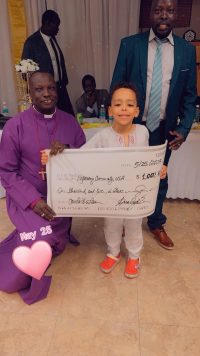
Bishop Daniel Abot and the President of the Nyarweng Association, Mr Chol Deng Jok, receiving a cheque for $1,000 from young Kuol in Missouri in May 2024
At the convention I shared about the eight years I served as the honorary Bishop of the Diocese of Duk and my subsequent return to my Toowoomba-based wife, Rachel, and family. The delegates expressed such gratitude to the leaders in our Diocese for prioritising the funding of my Anglican Church Southern Queensland role, especially to Bishop Cam. They understand how important it is to have a leader able to focus on serving a diaspora community.
Advertisement
However, the primary reason for my trip was to visit Fargo in Dakota to attend a gathering of fellow “Lost Boys of South Sudan” — a group of over 20,000 boys, mainly from the Dinka and Nuer language groups, who fled because of military conscription and for being targeted for their gender by the then Government of Sudan during the Second Sudanese Civil War between 1983 and 2005. The boys who survived the month-long desert journeys — with all the dangers of disease, wild animals, dehydration, starvation and airplane bombing — then grew up in refugee camps. I was 10 when I fled my family’s village, first to a refugee camp in Ethiopia and then again on foot to a refugee camp in Kenya.
It was a joy to meet up with many of the boys whom I walked in the desert with and grew up with in the refugee camps. They asked me to come and speak to them about the current situation in South Sudan, having just visited, and also as the former Bishop of the Diocese of Duk.
They came from places spread across the USA and Canada. They have built successful lives for themselves and their families in the countries that have given them safety. This group, whom I have known since I was a child, continue to assist with projects — they are the main supporters of an orphanage in Juba.
Related Story
 Justice & Advocacy
Justice & Advocacy
“Remember the Sudanese people in your personal prayers and in your Sunday service intercessions”
Because of their ongoing generous giving, many people in South Sudan and in refugee camps in neighbouring countries have a future to look forward to. These former Lost Boys in Canada and the US know that many would not make ends meet without their support.
I had many moving conversations in Fargo. I was very humbled by a woman, whom I first met in the Kenyan camp when I was 19 years old. She now lives in Canada and, upon hearing that I would be visiting Fargo, she told her husband that they needed to come and see me.
Another person, whom I met in the Kenyan camp when I was 19 years old, drove eight hours from Nebraska in his semi-trailer truck because he heard I was coming to Fargo.
Hugging people with tears of joy was the highlight of my recent trip to the US for me. We former Lost Boys had lots to reminisce about because we are such good friends — we kept each other alive on the long desert journeys and during our 15 years in the refugee camps.
I would like to thank the South Sudanese diaspora in the United States for inviting me to come and to join and speak at their events.
I especially thank the president of the Duk Community Association of the USA, Chol, and his wife, Nyanacha, for their hospitality in Fargo. They made me feel right at home and were so generous and welcoming.

